9h agoWed 19 Nov 2025 at 5:17amMarket snapshotASX 200: -0.25 at 8,447 points
Australian dollar: -0.4% to 64.82 US cents Wall Street: Dow Jones (-1.1%), S&P 500 (-0.8%), Nasdaq (-1.2%) Europe: FTSE (-1.3%), DAX (-1.8%), Stoxx 600 (-1.8%)Spot gold: +0.4% at $US4,083/ounce
Oil (Brent crude): -0.2% to $US64.78/barrelIron ore: -0.4% to $US104/tonneBitcoin: -1.6% to $US90,948
Prices current around 16:17pm AEDT
Live updates on the major ASX indices:
8h agoWed 19 Nov 2025 at 5:48am
Bye bye
That’s it from us.
Thank you for joining us for a busy trading day.
All eyes will be on Nvidia as it releases its quarterly results tomorrow morning (Australian time).
Tune in to The Business at 8:45pm (AEDT) for all the latest updates.
Good bye
Loading
8h agoWed 19 Nov 2025 at 5:46am
‘We’ve saved Australians half a billion dollars’
CEO Andrew Irvine says NAB has done more than any other major bank for low-income Australians.
Responding to a question from Julie-Ann Campbell, member for Moreton, Mr Irvine estimated that NAB had saved Australians “half a billion dollars” by not charging account-keeping fees since 2016.
“It’s something we’re incredibly proud of,” Mr Irvine said.
He noted that NAB wasn’t on the “ASIC charge sheet,” which spotlighted some of the big Australian banks’ practices earlier this year.
In July, ASIC found that more than 2 million low-income Australians were still in high-fee accounts.
“We estimate that we have saved Australians something like half a billion dollars in fees,” Mr Irvine said.
Mr Irvine said the bank “probably hasn’t” got the commercial recognition for removing account-keeping fees to avoid creating “customer detriment”.
“The bank chose not to charge for that fee in the hope that we would get more Australians to bank with us.”
9h agoWed 19 Nov 2025 at 5:37am
Cyber threats in banking are ever-increasing: NAB CEO
NAB CEO Andrew Irvine admitted that cyber threats were becoming a growing problem for Australia’s major banks.
He was responding to a question from Deakin MP Matt Gregg, who asked if the government had been effective in supporting the banking industry’s efforts.
Mr Irvine explained that he was a member of the federal government’s cybersecurity council.
“We know the threat vectors are ever-increasing … we’re working tirelessly [at NAB] to ensure that any vulnerabilities are addressed as quickly as possible, and we have a regulator that impresses that upon us.
“There’s nothing I’m more focused on than keeping our bank and our customers’ information safe.”
Later in the hearing, when speaking about business fraud, Mr Irvine gave an example of a fraudulent $100 million invoice that was presented to the company, as he urged customers to “stay vigilant”.
“We had a very large payment go through in the public domain of well over 100 million dollars. It was a case of invoice fraud,” Mr Irvine said.
“[The company] called the number on the fraudulent invoice and corroborated that the invoice was real – but with the fraudster and not the [real] number they had on file.
“These criminals are sophisticated … they are relentless in pursuing opportunities to capture our hard-earned money.”
9h agoWed 19 Nov 2025 at 5:29amLocal share markets close down
Australian share markets have closed down after a fairly flat day of trading.
The ASX 200 closed down -0.25% to 8,447 points, while the broader All Ordinaries index closed down -0.2% to 8,721 points.
Having a look at the sector summary, energy, basic materials, and real estate drove the gains, while financials and industrials were in the red.
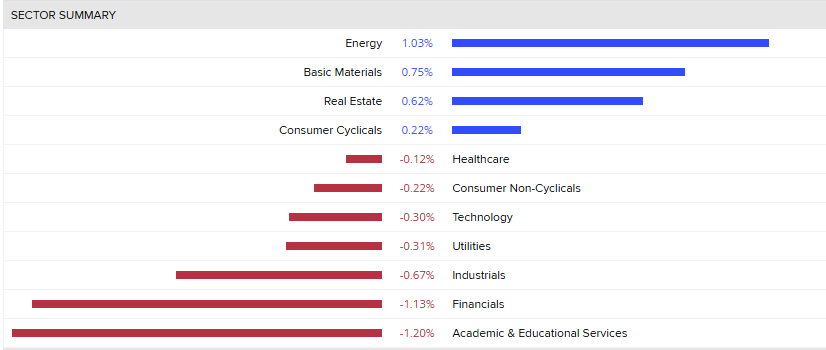 Sector summary (LSEG)
Sector summary (LSEG)
In terms of individual stocks on the ASX 200, DroneShield led the losses, plunging 20% on news its US CEO has stepped down, without explanation.
Catapult Sports and Megaport were also down.
GQG Partners and Lynas Rare Earths led the stocks in positive territory.
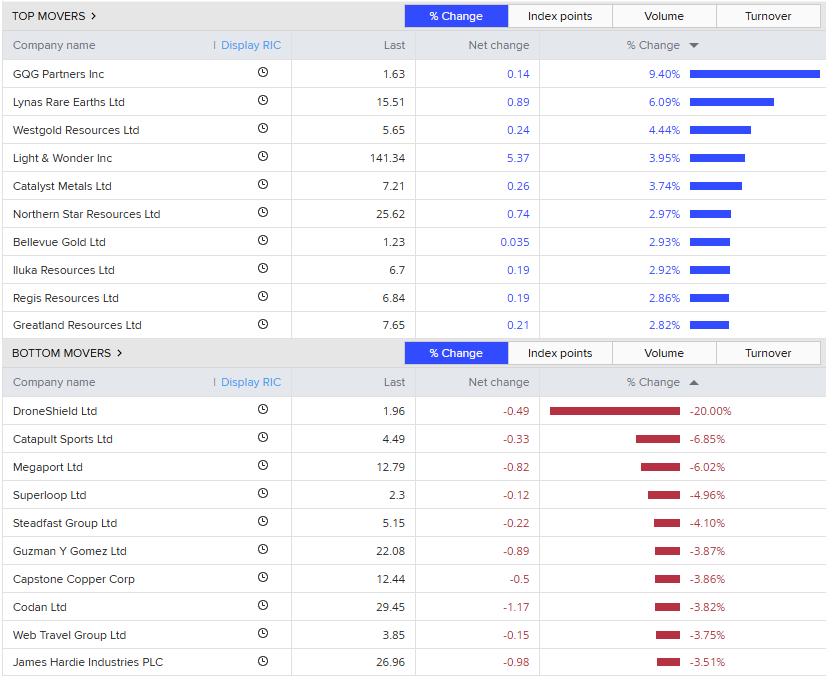 Top and bottom movers (LSEG)
Top and bottom movers (LSEG)
In other news, Webjet closed up 16.5% on news of a takeover offer from Helloworld Travel.
The Australian dollar is down almost 0.4% to 63.80 US cents.
9h agoWed 19 Nov 2025 at 5:27am
Star Entertainment fails performance hurdles
Star Entertainment’s top executives won’t receive long-term performance rights for the seventh straight year after the company failed to meet key performance hurdles.
In a statement to the ASX, the embattled casino operator’s board said the rights granted for the year ending in June 2022 were cancelled after Star fell short on all three metrics used to determine vesting – earnings per share, relative total shareholder return and return on invested capital.
Earnings per share fell from 32 cents in 2017 to a loss of 14.9 cents in 2025.
Star’s total annualised return in Australian dollar terms has fallen 37.7% since the start of the fiscal year 2019, compared to a 8.8% growth in the ASX200 benchmark index.
Star has faced bankruptcy in recent years and has been embroiled in legal challenges for alleged money laundering.
Star’s shares were trading unchanged at 8.3 Australian cents apiece a few minutes before trading closed on Wednesday, after having risen to 8.5 cents a share earlier in the session.
Reporting with Reuters.
9h agoWed 19 Nov 2025 at 5:15am
What’s the deal with Nvidia?
Chipmaker Nvidia is all over the news right now.
The company has been influencing global share markets ahead of its quarterly earnings (which are released tomorrow morning AEDT).
It’s a big deal because it’s a huge company – its current market value is about US$4.6 trillion, which gives it an 8 % weighting in the S&P 500 index.
Nvidia is a market leader in artificial intelligence (AI) and its graphics processing units dominate the market for training large language models.
Investors are concerned that AI may be entering bubble territory, and Nvidia is a bellwether.
“As the anchor of the AI capex trade, its results will help define whether we’re in the next leg of expansion or entering digestion mode,” said Chris Murphy, co-head of derivatives strategy at Susquehanna.
“The signal it sends — on demand, margins, supply chain, and investment posture — could shape sentiment across semis, hyperscalers, and AI infrastructure at large,” he said.
“So while the stock may move plus or minus 7%, the narrative impact could extend across $10 trillion worth of correlated trades.”
Nvidia shares are up almost 40 % for the year.
However, it has come under pressure in recent days with some high-profile investors, including billionaire Peter Thiel’s hedge fund, exiting the stock.
Reporting with Reuters
9h agoWed 19 Nov 2025 at 4:54am
Could there be a Webjet bidding war?
Today’s $353 million takeover bid from Helloworld Travel could result in another offer for Webjet, says RBC Capital Markets’ analyst Wei-Weng Chen.
In an analyst note, he says the company has now received two non-binding indicative bids in the space of six months.
“Importantly, this bid comes despite WJL downgrading FY26 earnings expectations.”
In May, BGH Capital and Gary Weiss (who together hold a 17.8% stake) made an unsolicited offer of 0.80 cents per share, which was rejected by the board.
Yesterday, BGH Capital and Gary Weiss extended their cooperation agreement in relation to the affairs of Webjet for another six months.
“While BGH’s proposal of 80cps in May-25 was rejected by the board, we expect HLO’s offer could result in a revisited offer. Our PT for WJL is $1.10, which does not factor any premium for control.”
10h agoWed 19 Nov 2025 at 4:34am
NAB’s October outage caused by ‘coding error’
CEO Andrew Irvine is asked by member for Deakin Matt Gregg what was behind last month’s NAB outage, which affected its internet banking for about three hours.
Despite the October incident, Mr Irvine says the bank’s outages have reduced by around 80 per cent since 2018.
“But in every tech-intensive organisation, now and then you have outages,” he says.
“The single biggest thing our customers dislike is when they can’t use their banks’ services.
“There’s a learning review every single time there’s an outage.”
When Mr Irvine doesn’t directly answer the question, Peter Whitelaw, NAB’s acting group chief risk officer, says the October outage was due to “a simple coding error”.
“It should have been picked up and wasn’t,” Mr Whitelaw says.
Mr Irvine adds that changes within the bank can occasionally disrupt services.
“At least eight out of 10 issues when we have an issue are caused by a change initiated by the bank,” he said.
“The quantum of change within our bank is significant as we are always seeking to improve. That change is the biggest cause of issues.”
10h agoWed 19 Nov 2025 at 4:14am
Could the AI rally continue?
While most investors seem concerned about a potential AI bubble this week, Capital Economics has published a note arguing that the rally “might not be over yet”.
Head of Markets Asia Pacific Thomas Mathews says the tech stock valuations aren’t as elevated as they might seem.
Collectively, the combined consumer discretionary, communication services and IT sectors of the S&P500 have outperformed the rest of the market to a degree that rivals the dotcom bubble.
However, Mr Mathews says, while much of that has been about strong earnings growth, valuations have surged too.
“We think there are, though, good reasons for valuations to have risen, and they aren’t, in aggregate, cause for alarm on their own,” he argues.
“First, the decline in real ‘safe’ asset yields this year arguably means that the sustainable level of equity valuations has risen. The 10-year TIPS yield, for example, has fallen by ~40bp year-to-date.
“In fact, the ‘excess earnings yield’ of the combined tech sectors – the spread between their forward earnings yield and the 10-year TIPS yield – has risen slightly since end-2024, implying that valuations have become less stretched when the level of real yields is accounted for.”
Secondly, he says expectations for long-run earnings growth may have risen.
Between 1995 and 2022 (before the AI boom began), the combined earnings per share of the S&P tech sectors grew at around 7% per annum. Since then, it’s grown by more than twice that.
“All that suggests to us that tech valuations could rise a lot further before they become a genuine cause for concern.
“Instead, we suspect that the near-term risks are more about perceived demand for AI, or whether capex is excessive.
“Our forecast for the S&P 500 to rise to 8,000 by end-2026 implicitly assumes that valuations will rise a lot further before the bubble, if there is one, bursts.”
10h agoWed 19 Nov 2025 at 4:04am
Market snapshotASX 200: -0.2 at 8,454 points
Australian dollar: -0.5% to 64.7 US cents Wall Street: Dow Jones (-1.1%), S&P 500 (-0.8%), Nasdaq (-1.2%) Europe: FTSE (-1.3%), DAX (-1.8%), Stoxx 600 (-1.8%)Spot gold: flat at $US4,065/ounce
Oil (Brent crude): -0.4% to $US64.6/barrelIron ore: -0.4% to $US104/tonneBitcoin: -0.7% to $US91,773
Prices current around 3:04pm AEDT
Live updates on the major ASX indices:
10h agoWed 19 Nov 2025 at 4:01am
Apartment construction recovery?
The foundations are being laid for a recovery in apartment building from next year onwards, says the Housing Industry Association.
Chief economist Tim Reardon says population growth, rising established house prices, and new policy measures are creating the conditions for the next major building cycle.
“These are the early signals of an emerging apartment cycle, as new developments once again start to stack up financially.”
Just over 61,000 multi-unit dwellings started being built in 2024, well short of what is required to meet the national housing target.
Multi-unit starts are forecast to increase by 6.5% in 2026.
“If state governments recognise that high taxes on apartment builders and financiers have limited supply and address these issues, the recovery could accelerate further,” Mr Reardon said.
The HIA says the apartment recovery will occur alongside growth in house building and renovation work.
“This will not be a speculative boom. It’s a necessary response to growing population pressures and rising demand for housing in our major cities,” said Mr Reardon.
10h agoWed 19 Nov 2025 at 3:45am
Banking job losses inevitable due to AI: NAB CEO
Julie-Ann Campbell, member for Moreton, asks NAB CEO Andrew Irvine about potential job losses in the banking industry due to the growth of AI and automation.
“Do you think there will be job losses as a result of AI and automation?” Ms Campbell asks.
“Over time, I think there will be,” Mr Ivine says. “But we shouldn’t run away from that.”
Mr Irvine describes AI as “one of the most consequential innovations in our lifetime”, as significant “as the motor car, as electrification, as the internet”.
“They all improved things for the better, but they had positive and negative consequences for employment. And this will be the case here,” he says.
“We need to encourage workers to lean into AI, learn to adopt, skill up.
“Workers who know how to use AI well are going to take the job of workers who are afraid of AI.”
11h agoWed 19 Nov 2025 at 3:30am
‘We want bad news to take the elevator’ — NAB
Andrew Irvine, managing director and group CEO of National Australia Bank, is addressing the House Standing Committee meeting as it reviews Australia’s four major banks.
He was asked by chair Ed Husic what steps NAB had taken to improve its governance and ethics, following the Royal Commission on Australia’s banking system.
Mr Irvine said it was “clearly a traumatic period for our bank” when Australia’s major banks were heavily criticised in the findings of the Royal Commission.
“It was difficult reading, pretty confronting,” he said.
“I think it’s important we never enter a period like that [again], as a bank, as an industry, as an institution.
“We have executed and deployed all recommendations that were pertinent to NAB following the Royal Commission.”
Peter Whitelaw, NAB’s Acting Group Chief Risk Officer, said the bank was actively trying to be more pro-active in addressing any potential problems that might arise.
We want to “identify and fix issues quickly, providing the cultural willingness for people to escalate bad news and feel comfortable doing so”.
“We want bad news to take the elevator and good news to take the stairs,” he said.
11h agoWed 19 Nov 2025 at 3:18am
Japanese debt in focus
Japan’s Prime Minister, Sanae Takaichi, needs cash to spend on the economy, to help stimulate growth.
This requires government bond sales.
The more bonds you sell on bulk, the higher the yields go.
Bond yields move inversely to bond prices.
With that backdrop, here’s a fresh note from IG’s Tony Sycamore:
“Investor fears over ballooning issuance and delayed [Bank of Japan] BOJ rate hikes have sparked volatility.”
“Yesterday, the Nikkei tumbled 3.17% and the Japanese Yen weakened to an almost 10-month low of 155.73 vs the USD, despite recent verbal jawboning.
“Ahead of this afternoons 20-year [Japanese Government Bond] JGB auction, yields on the 20-year JGB have rallied 3bp to 2.82% and are now up 24bp MTD.
“The yield on the 30yr JGB has today hit a fresh record high of 3.34% and is up a chunky 30bp in November.
“With nerves still frayed from yesterday’s volatility episode, a poorly received bond auction is not what markets need right now.”
The market fear here is that Japanese bond yields spike, attracting vast inflows of foreign capital into Japan.
It’s a fear because those inflows may come from Wall Street — a mass exodus out of US stocks.
11h agoWed 19 Nov 2025 at 3:01amHow’s your super fund performing?
Despite market jitters, super researcher Chant West says superannuation funds are on track to deliver solid results this year.
Super funds grew for the seventh consecutive month in October, with the median growth fund returning 1.2% over the month.
Senior Investment Research Manager Mano Mohankumar says a final result near 7.8% would be a good outcome, given the uncertain economic and geopolitical backdrop this year.
“That return is well ahead of the typical long-term return objective which translates to about 6%. Super fund members should also remember that this year’s result follows two exceptional years, with returns of 9.9% in CY23 and 11.4% in CY24.
Given the strength of share markets over the past three years, super fund members in higher risk portfolios have fared even better,” he said.
This table compares the median performance to the end of October 2025, for each risk categories.
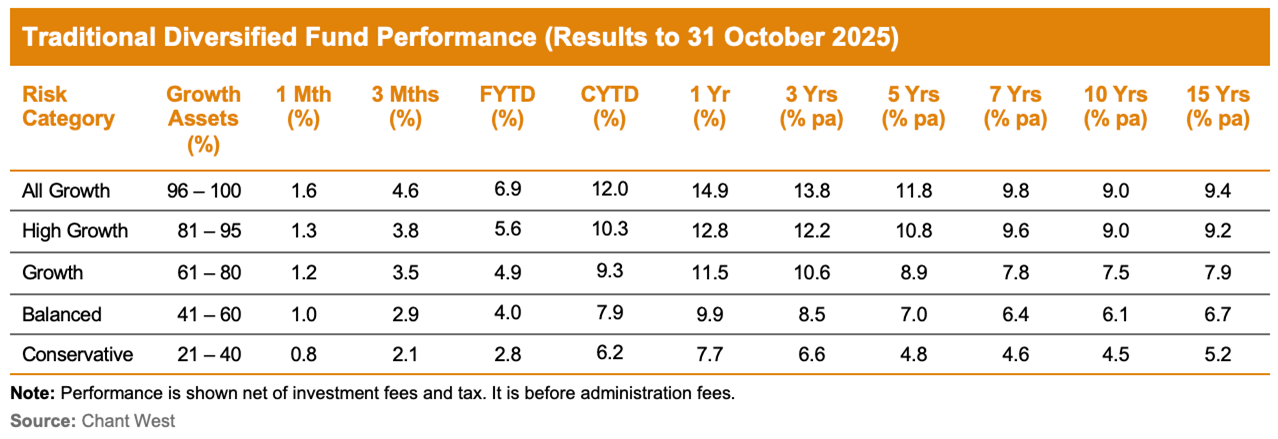 Median super performance (Chant West)11h agoWed 19 Nov 2025 at 2:40amIs wages growth a real increase or decrease?
Median super performance (Chant West)11h agoWed 19 Nov 2025 at 2:40amIs wages growth a real increase or decrease?
A journalist has quizzed the Treasurer Jim Chalmers on whether the 0.8% wages growth in the September quarter was a real increase — or decrease.
The Treasurer responded:
“We compare the annual figures, 3.4 versus 3.2%. When it comes to annual real wages growth, which strips out some of the lumpiness from quarter to quarter.
What we’ve seen now is two full years of continuous real wages growth in our economy.”
12h agoWed 19 Nov 2025 at 2:35am
Exec remuneration distorts pay data
Why are you leaving out the important detail that this is total wage bill growth? A rise in the average is not a rise in the median, which in fact has dropped because execs are taking more.
How many nurses or teachers or supermarket workers are getting 3.8%pa more?
– Nick
Hi Nick,
You make a good point.
What we focus on is what the RBA focuses on, which is the aggregate data.
I agree with you, the figures are distorted by the pay executives receive, and it’s worth noting that.
But policy makers only look at the aggregate data when determining policy, so within analysis on interest rates etc, looking at the low wage growth for some industries is largely irrelevant.
Is that right? Probably not. But that’s above my paygrade.
Hope that helps.
DT
12h agoWed 19 Nov 2025 at 2:27amTreasurer says Australians are earning more
Treasurer Jim Chalmers is with the Minister for Employment in Perth.
“We’ve got some very good news on the economy today,” he said.
“This is the longest period of real wages growth in almost a decade.”
12h agoWed 19 Nov 2025 at 2:24amMinister for Employment says wages growth is ‘good news’
The Minister for Employment and Workplace Relations, Amanda Rishworth, says wages have grown for eight consecutive quarters.
“It’s really good news that there’s been solid wages growth, now at 3.4% across the country,” she said at a press conference in Western Australia.
Minister Rishworth says the Albanese government has been committed to re-energising enterprise bargaining.
“A key contributor of the growth in wages we’ve seen released today has been enterprise bargaining. In the most recent enterprise bargaining data we saw new enterprise agreements delivering a 4.2% annual wage increase.”

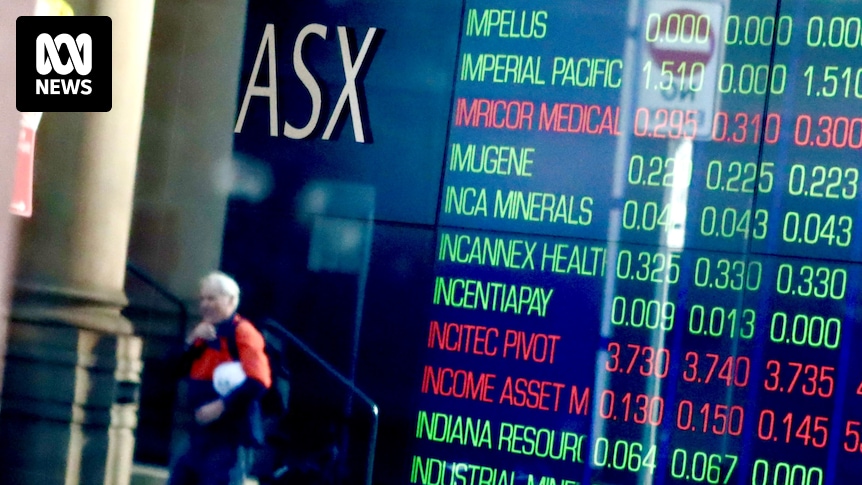
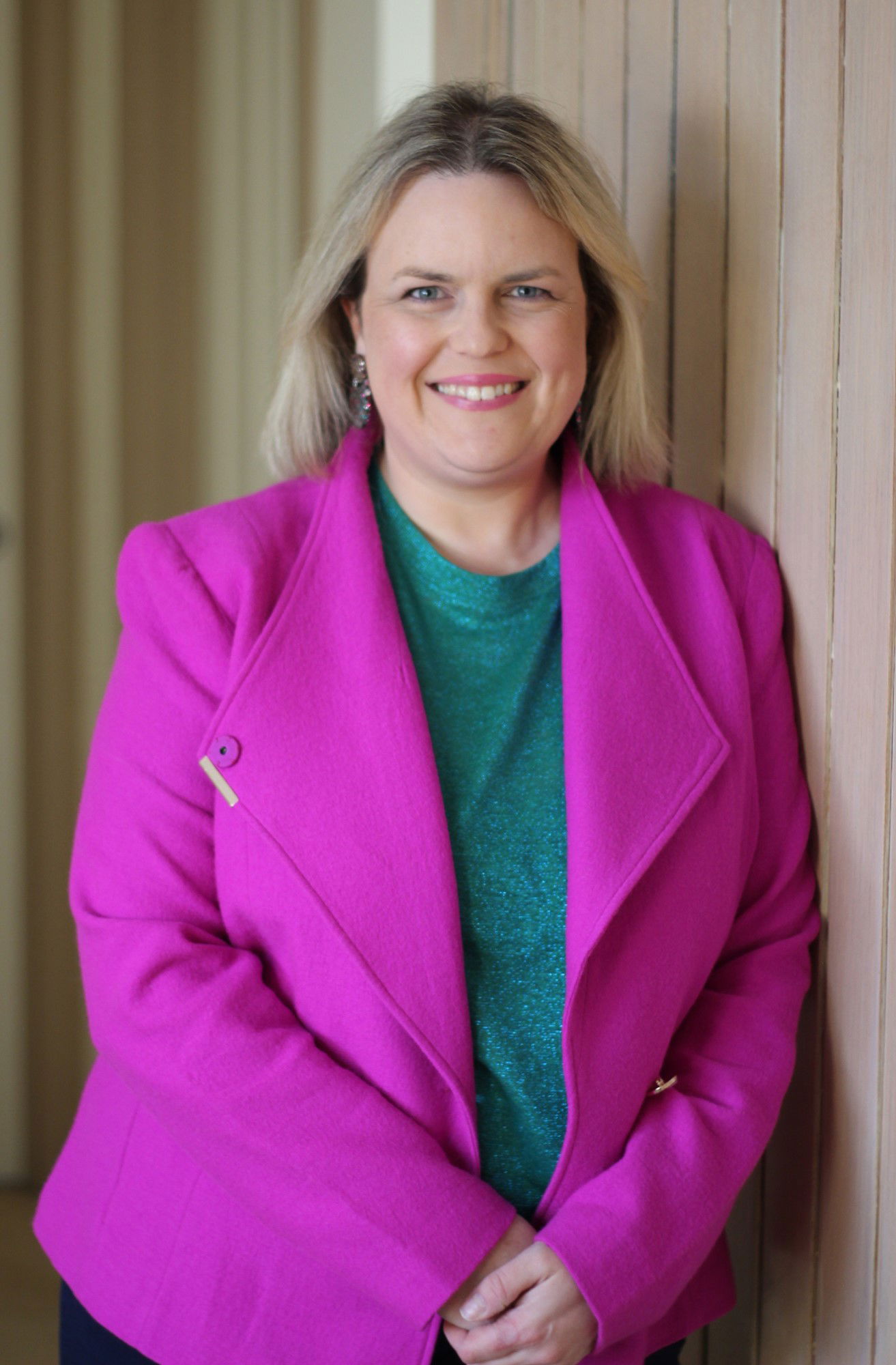 ASX 200: -0.25 at 8,447 points
ASX 200: -0.25 at 8,447 points
